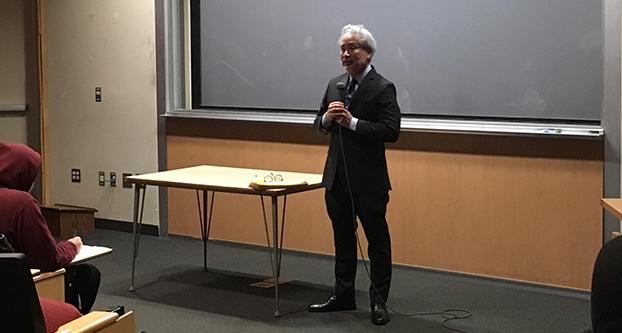Last Friday night’s CineCulture screening of the film “And Then They Came For Us” detailed the harsh realities of Executive Order 9066, which resulted in the incarceration of more than 120,000 Japanese Americans during World War II.
“And Then They Came For Us,” directed by Abby Ginzberg and Ken Schneider, told the history of Japanese American citizens forced into internment camps after the attack on Pearl Harbor by Japan military fighters in 1941.
With pictures from government-employed photojournalist Dorothea Lange and testimonies from former internees, audience members learned of the loss of freedom of Japanese-Americans on the basis of “national security.”
“What started as a race-based curfew ended within a couple months as a race-based detention and incarceration,” said film discussant Don Tamaki.
Tamaki spoke of his time as an attorney serving on Fred Korematsu’s legal team to overturn his criminal conviction for refusing to be interned. He emphasized its relevance to President Donald Trump’s proposed executive order banning travel from Muslim-majority countries.
“I think what the film [underscores] is, ‘Are we as a nation about to repeat history all over again?’” Tamaki said.
Despite federal district courts finding the travel ban in violation of the Immigration and Naturalization Act as well as the First Amendment establishment clause on the basis of religious discrimination, the courts are deferring to the executive due to a protected homeland security memorandum, Tamaki said.
The court has the right to review the president’s actions before a civil liberties disaster occurs, Tamaki said.
“This idea that the actions of the president are not reviewable by a court, there’s no control, no one asks questions — that’s a scary proposition,” Tamaki said.
When an audience member asked if America had learned anything from the Japanese internment, Tamaki said the conversation of the evening was proof of change.
“I optimistically think that if the country had not learned anything, they would have rounded up Arab Americans following 9/11,” he said.
The evening was sponsored by the Central California District Council of the Japanese Americans Citizens League (JACL) and the Islamic Cultural Center of Fresno (ICCF). Members of both organizations spoke about how the events of the past have influenced the future.
Hajj Reza Nekumanesh, executive director of ICCF, explained that Japanese Americans were among the first to stand in solidarity with Muslim Americans following the terrorist attacks of 9/11.
“Foremost, they understood that the reality of liberty is that my and your liberty are but imaginary and worthless, unless it’s for all of us,” Nekumanesh said.
Speaking on behalf of JACL was Dale Ikeda, a former judge of the Fresno County Superior Court. He said it was the civil rights communities and Jewish organizations who helped bring about the presidential apology and monetary payments to former internees. Now, Japanese Americans stand with Muslim Americans, as they have been in that position in the past, he said.
Fresno residents Saburo and Marion Masada recounted their transition back to everyday life after leaving the internment camps.
“We tell our story because so many of my generation, their voices were silenced by the trauma that we experienced,” Saburo Masada said.
Marion Masada said that the psychological effects of holding the pain inside is the greatest damage. Talking through her experiences can bring up old memories, but it also heals the pain, she said.
“I was molested in camp, and for years and years and years, I saw that man’s face,” Marion Masada said. “But all of a sudden one day, while at the Tule Lake Pilgrimage, I didn’t see that man’s face anymore.”
Saburo Masada, who was also featured in the film, explained that many Japanese families had lost everything upon returning home. He said 75 percent of Japanese American farms were lost, though his family was fortunate to have friends look over the farm while they were gone.
“Marion’s family lost everything. Even their car was just a shell. No tires, no engine, nothing in the car, just the shell. Many of us who came back had to start from scratch,” Saburo Masada said.
Fresno State junior Nancy Deanda attended the film screening and discussion as a requirement for the CineCulture class, but she said she learned from Tamaki’s emphasis of the relevance of this topic.
“I think with people who are a part of the [JACL] and standing up against [the ban], I think that it’s really cool they’re here to say, ‘Don’t even let it get that far,’” Deanda said.
She said she left with the message to be an activist and not to stay silent.
“Be proactive about things even if they’re not directly related to you, or your religion or your direct beliefs,” Deanda said. “It’s important to stand up for other people, too.”





LivinLaVida • Mar 6, 2018 at 1:41 pm
Japanese internment did not really happen. This is a way for the Japanese to turn attention away fro the comfort women issue, and really blatant.